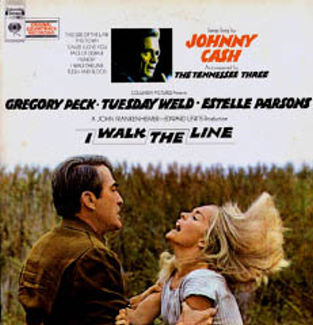
I WALK THE LINE
US, 1970, 97 minutes, Colour.
Gregory Peck, Tuesday Weld, Estelle Parsons, Ralph Meeker.
Directed by John Frankenheimer.
I Walk the Line is one of Frankenheimer's minor films (major films include The Manchurian Candidate, Birdman of Alcatraz, Seven Days In May, The Fixer), and might have been excellent except for Gregory Peck's unsuitability for the main role (at times he looks too noble to go through such human suffering, at times he is too impassive, while others act so well around him). Nevertheless, the film is worth seeing.
Like The Gypsy Moths, Frankenheimer's film prior to this one, I Walk the Line, is about ageing, unfulfilled ambitions and the crises of career and marriage that such a situation brings about. It is not that the sheriff falls in love with Alma, but simply that she is there and willing, and the suffering man sees nothing else but a way out of suffering that he trusts blindly will save him. The film shows how responsibility to community, and family, cannot be completely ignored for long, and if the escape route is idealised and not seen for what it is, then a disillusionment is the painful result.
Frankenheimer shows us this fairly simply in a realistic Tennessee town with shops, drive-in and flitting moonshiners.
Beautifully photographed, the film is framed with scenes of ageing faces that set the tone. Acting, apart from Peck's, is excellent. Johnny Cash's songs correspond to the backwoods' setting and rhythm of the film but do not seem strictly necessary. Showing an al1-too-frequent situation, this is a good, sad film.
1. What was the theme of this film? How did Johnny Cash's song, "Because you're mine, I walk the line" and the succession of faces and profiles of old people convey the theme of the film?
2. The film opens with the sheriff thinking, his face grim like those of the other ageing people. He is slow to respond to the call from his office about his wife. What did that suggest to you about the theme of the film?
3. What was the sheriff's frame of mind and attitude towards life at this stage of his career - responsible for his being dissatisfied with his home life, capable of improving his position but had never done so, antagonistic towards his subordinates, gruff in manner?
4. Would the sheriff have let the girl off? The first thing we are shown about her is her love for her family and her irresponsibility. Is this a true pattern for her behaviour throughout the film?
5. Why did the sheriff fall in love with her? Why couldn't he see the difficulties of going away with her, plus the fact that she and he were being used by her family?
6. What kind of a person was the Deputy - ogling girlie magazines, having a slatternly wife?
7. Were we shown enough of the sheriff's family life to help us understand why he fell in love with Alma? meals at home, his wife's concern, yet her age and plainness, the outings to the drive-in. What more could his wife have done to save the marriage?
8. Once he was infatuated, his sense of order and responsibility went, shielding the moonshiners, getting rid of the deputy's body? What does this show of the sheriff's personal decline?
9. How was the sheriff disillusioned by Alma? What was the significance of her stabbing him? Did she ever love him at all? What future was there for him? How much had he suffered?
10. Did the backwoods' setting give a sense of realism to the film? Was the story and were the emotions credible?
11. Did Johnny Cash's songs help the film? Why did the film end with profiles of ageing people?